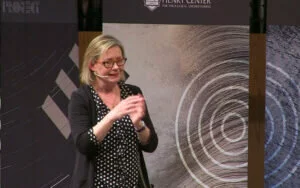“A life for eternity.” Twenty years ago, that’s how Dallas Willard’s classic The Divine Conspiracy described the life of discipleship pictured in the Sermon on the Mount.
He further explains: “that is, a life for eternity because it is already in the eternal.”Dallas Willard, The Divine Conspiracy: Rediscovering Our Hidden Life in God, (New York: Harper, 1998), 97. Willard sees in the sermon Jesus’ answers to the two biggest questions humanity has and will ever face: which life is the good life, and who is truly a good person? For some reason, it took Willard—a philosopher who made his career teaching twentieth century phenomenology—to awaken many Christians from their stale and settled understandings of the Sermon on the Mount. With the recent publication of Jonathan Pennington’s The Sermon on the Mount and Human Flourishing (Baker Academic, 2017), we now have a New Testament scholar and Gospels specialist addressing in a thoroughly textual and seriously historical way those questions that Willard raised more than two decades ago.
In essence, Pennington is asking the same basic question: how does Jesus’ Sermon envision true human flourishing? The work, however, straddles several disciplinary borders in its attempt at offering a fresh proposal for Pennington is asking the same basic question: how does Jesus’ Sermon envision true human flourishing?reading the Sermon that accounts for the literary, historical, philosophical, theological, and ethical aspects that inform it. In three parts, Pennington’s text provides a rich background for the Sermon in the Jewish and Greek virtue traditions that precede it and the key aspects and structures it contains, a careful exegetical commentary of all the verses in the famous passage, and a culminating theological proposal for the Sermon’s significance for any Christian account of the good life today. The final product is a something that, according to Scot McKnight, not only comprehends the Sermon so well as to make a significant contribution to the history of its interpretation but is also creatively “baptizing this great collection of Jesus’ teachings into the wisdom tradition of human flourishing and virtue ethics.”
In light of the interdisciplinary nature of Pennington’s volume, we have organized a varied panel of scholars to interact with the book and its unique perspectives. The symposium thus seeks to attend to the ways in which the book intersects the various fields of theological ethics, systematic theology, and biblical studies. For our conversation on this important and controversial text, our participants include:
Taylor B. Worley (PhD University of St. Andrews) is Associate Professor of Faith and Culture as well as Associate Vice President for Spiritual Life and University Ministries at Trinity International University in Deerfield, Illinois. His publications include Theology, Aesthetics, and Culture: Responses to the Work of David Brown (Oxford University Press, 2012), Dreams, Doubt, and Dread: The Spiritual in Film (Cascade, 2016), Contemporary Art and the Church (IVP Academic, 2017), and most recently “Paradise Reclaimed: Kerry James Marshall and Chris Ofili in the Garden of Eden” in The Moving Text (SCM Press, 2018).
Steven R. Guthrie (PhD University of St. Andrews) is Professor of Theology and Religion and the Arts at Belmont University in Nashville, Tennessee, where he helped launch a new program in religion and the arts. He previously taught at the University of St. Andrews and was on the faculty of the Institute for Theology, Imagination, and the Arts. He has published Creator Spirit: The Holy Spirit and the Art of Becoming Human (Baker Academic, 2011), Resonant Witness: Conversations between Music and Theology (Eerdmans, 2011), and Faithful Performances: Artistry, Embodiment and the Enactment of Christian Identity (Routledge, 2016).
Steven M. Bryan (PhD Cambridge University) is Professor of New Testament at Trinity Evangelical Divinity School in Deerfield, Illinois. He is the author of Jesus and Israel’s Traditions of Judgement and Restoration (Cambridge University Press, 2005), and “Jesus and Israel’s Eschatological Constitution,” in The Handbook of the Study of the Historical Jesus (Brill Academic, 2011). Before coming to TEDS in the fall of 2016, Dr. Bryan served as a missionary in Ethiopia for more than 23 years, served as the first Dean of Studies of the Ethiopian Graduate School of Theology for six years and taught for many years at the Evangelical Theological College in Addis Ababa.
Jonathan T. Pennington (PhD University of St. Andrews) is Associate Professor of New Testament Interpretation and Director of Research Doctoral Studies at the Southern Baptist Theological Seminary in Louisville, Kentucky. He is the author of Heaven and Earth in the Gospel of Matthew (Baker Academic, 2009), and Reading the Gospels Wisely: A Narrative and Theological Introduction (Baker Academic, 2012), and editor of Cosmology and New Testament Theology (T&T Clark, 2008). He is currently writing the revised Pillar Commentary (PNTC) volume on Matthew.
In this symposium, the three perspectives offered demonstrate appreciation for the volume but also outline ways to extend or clarify the reach of Pennington’s generative project. Taylor Worley pursues Pennington’s concern for the reconciliation of grace and virtue with the aid of another deeply engrossed commentator of the Sermon—namely, insights from Dietrich Bonhoeffer’s Discipleship. Steve Guthrie explores how a more deliberate tracking through Matthew’s gospel of the role of the Holy Spirit could enhance Pennington’s overall perspective. Steve Bryan provides an appreciative but rigorous critique of Pennington’s claims about the cultural context of the Sermon and weighs those conclusions against his own. Pennington, then, offers a response to the three reviews that explores how the discussion will develop from here.







Comments
Be the first one to make a comment!